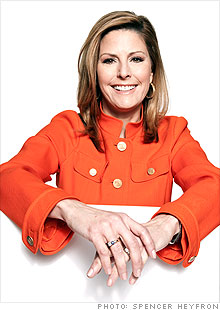Search News
FORTUNE -- If Republican leaders were serious -- and gutsy -- about using the Gulf oil spill as an opportunity to put the nation on a sane energy course, they'd pull out a little-noticed bill sponsored by Arizona's Jeff Flake and South Carolina's Bob Inglis and plop it atop their 2010 campaign book.
But they won't. It's politically lethal. Why? Inglis and Flake, two House members with impeccable conservative credentials, want to impose a carbon tax on the nation.

Surprised? Most people are. But scratch the surface at conservative think tanks and universities that house free-market economists, and it's not hard to find proponents of a carbon tax. Not as an industry directive from Washington, nor as a revenue grab by the feds. Conservative carbon-tax proposals are revenue neutral: The Inglis-Flake bill offsets its carbon tax with a cut in payroll taxes.
Instead, free-marketers view a carbon tax as a way to cover a public cost -- something economists call "negative externalities." In 2008, Harvard's Greg Mankiw, formerly chairman of George W. Bush's Council on Economic Advisers, wrote a paper extolling the virtues of what he called a "Pigovian tax," named for the British economist Arthur Pigou. Here's how the argument goes: When economic transactions impose a cost or a benefit on individuals who are not part of the transaction, "Adam Smith's invisible hand will fail to lead to an efficient outcome." Therefore, Pigou -- "sometime friend and sometime nemesis to his more famous colleague John Maynard Keynes," as Mankiw notes -- argued that individuals and institutions should be charged for the external costs they impose on others.
Mankiw cites a range of costs for oil use -- ranging from accidents, congestion, and insurance to global climate change and national security. Imposing a simple tax, in sharp contrast to a cap-and-trade system (in which the government sets limits on emissions), would account for these costs and "let the market sort it out," he told me. Mankiw favors offsetting a carbon tax by reducing levies with more distorted effects, like those for income and corporate taxes.
A handful of conservative lawmakers have made the Pigovian argument, Flake and Inglis among them. "A conservative would favor taxing consumption rather than income," says Flake. "And this would mean no additional revenue coming to Washington." Flake, who sides with those who believe "the jury is still out" on the extent to which global warming is man-made or can be turned around, adds this: "You don't have to believe in global warming to recognize there are negative externalities" to fossil-fuel use. He cites national security, specifically America's dependence on "regimes that are less than friendly."
But selling the idea hasn't been easy. It's hard to imagine the GOP embracing the idea when House Minority Leader John Boehner has portrayed the Democrats' cap-and-trade bill as "a carbon tax, plain and simple." Look no further than Inglis's recent defeat by a Tea Party primary opponent for the dangers of embracing ideas like this. Moderates and conservatives don't trust any Congress, let alone one controlled by Democrats, to offset carbon fees by lowering other taxes -- especially with historic deficits and a mounting need for federal revenue. Still, a revenue-neutral carbon tax returns the costs to the consumers of carbon. In contrast, emissions mandates result in higher car prices for all buyers, regardless of how much carbon-producing gas a driver uses.
Right now, as the midterm elections loom, GOP leaders know they can score far more political points by sitting back and watching the Democrats hang themselves with their own unpopular energy plan. "They realize the Democrats aren't exactly helping themselves with cap and trade," Flake says of his party leaders. Flake admits that the global-warming skeptics in his party pose another obstacle: "There's a fear that if we accept this [carbon tax], then we accept the global-warming argument, that it's a slippery slope."
When he was in the Bush White House, Mankiw had the audacity to suggest the idea of a revenue-neutral carbon tax to the President, who "made pretty clear that he thought [it was] a wacky idea." The funny thing, though, is that if pushed by conservatives who trust markets to make decisions, this is precisely the kind of wacky idea that could gain traction with the public -- and actually be good for the country. ![]()






| Company | Price | Change | % Change |
|---|---|---|---|
| Ford Motor Co | 8.29 | 0.05 | 0.61% |
| Advanced Micro Devic... | 54.59 | 0.70 | 1.30% |
| Cisco Systems Inc | 47.49 | -2.44 | -4.89% |
| General Electric Co | 13.00 | -0.16 | -1.22% |
| Kraft Heinz Co | 27.84 | -2.20 | -7.32% |
| Index | Last | Change | % Change |
|---|---|---|---|
| Dow | 32,627.97 | -234.33 | -0.71% |
| Nasdaq | 13,215.24 | 99.07 | 0.76% |
| S&P 500 | 3,913.10 | -2.36 | -0.06% |
| Treasuries | 1.73 | 0.00 | 0.12% |
|
Bankrupt toy retailer tells bankruptcy court it is looking at possibly reviving the Toys 'R' Us and Babies 'R' Us brands. More |
Land O'Lakes CEO Beth Ford charts her career path, from her first job to becoming the first openly gay CEO at a Fortune 500 company in an interview with CNN's Boss Files. More |
Honda and General Motors are creating a new generation of fully autonomous vehicles. More |
In 1998, Ntsiki Biyela won a scholarship to study wine making. Now she's about to launch her own brand. More |
Whether you hedge inflation or look for a return that outpaces inflation, here's how to prepare. More |